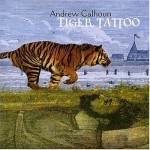Everclear
 Slow Motion Daydream
Slow Motion Daydream
Capitol Records
Everclear has been with Capitol records for seven years now, a mind-boggling figure when one considers that “label years” are even more multiplicative than “dog years.” It is safe to say that one human year probably equates to ten label years, so many changes can come to a major label in the span of a single human year. Whole regimes and administrations pass by in the blink of an eye. One day the corporation is owned by Seagrams, the next day it’s Philip Morris.
You don’t have to explain this to bandleader Art Alexakis, bassist Craig Montoya or drummer Greg Ecklund. Everclear has been with Capitol longer than either the Beatles or the Beach Boys were. With this, their fifth album for the label, the band clearly demonstrates that they are in total command of their studio powers; far more in touch with those powers than any flavor-of-the-month desk jockey sitting in an air conditioned office down on Sunset Boulevard.
Alexakis’ battles with the label have been well documented in these and other pages. Through it all, he has steadfastly insisted that he is the best (and the only) true arbiter of the state of his music. He has remained unswervingly in control of his artistic destiny, despite intense corporate pressure to turn out product on demand, according to their ledgers and timetables.
While all the executive positions, running the show at Capitol, have turned over many times in the duration of Everclear’s tenure, Art and the band have maintained a distinct musical identity. While some critics might (quite accurately) charge that the band is merely recirculating their former hits with (only slightly) different arrangements (a charge to which Alexakis must plead guilty); the tenor of their presentation has changed somewhat, over the course of time.
One of Art’s greatest strengths is his ability to embellish his admittedly limited musical canvas, with a variety of subtle production colorations and nuances. That aspect of his musical presentation has become especially more acute. As the band has grown in stature, he has been afforded a much richer palette (and much more time in which to employ it). If one approaches Everclear’s music as he would a haiku, or some other fairly rigid poetic or musical form; then there are rewards to be derived.
And it’s not as if Everclear is the only band to have a certain sameness about their sound. The formula has certainly worked for countless other rockers (just look at the Dave Mathews Band, or his little brother John Mayer, fer chrissakes), and the technique goes back to the days of the earliest days of rock. Each of the eleven cross-faded, interconnected songs presented here (as well as the twelfth “hidden track”), sound immediately familiar; instantly identifiable as being an Everclear song. In this world of product placement and limited attention spans, that is probably a good thing for a career. In the world of commercial radio, it’s called: hits galore.
And, to be sure, this album is loaded with radio-friendly potential hits. And these hits are even better than the former hits that they replace. If you loved “Santa Monica,” “Heroin Girl,” “I Will Buy You A New House,” and “AM Radio” you will love this album. If you always hated Everclear before, then this album isn’t likely to convert you.
What is immediately apparent among these dozen songs, besides his perpetual sense of the ironic, is that Art Alexakis is an hopelessly idealistic dreamer. It’s a beautiful day. He wants to live a beautiful life. He even wants to die a beautiful death. But he is also a pessimist. He doesn’t believe these dreams can really come true. Or if they do come true, Art doesn’t believe they can possibly last. Yet, at the same time, he is a cheerleader, telling other people about the hidden qualities and strengths which they possess.
As always, these songs are culled from Alexakis’ extensive psyche, amassed like a collection of treasured scabs. There are obvious lyrical references, within the context of these songs, to Art’s personal and business lives. Only one song, “Volvo Driving Soccer Mom,” departs from that first or second person perspective. In that song, Art takes the part of a thirty-something woman (perhaps he is exploring his feminine side?) who has mended her former wild ways. “I used to be a bad girl/I got busy in the bathroom at my high school prom/Yeah I used to be a dancer at the local strip club/But now I know my right wing from my wrong.”
While it’s no doubt true that Art is taking a swing at his uptight Republican peers (and others with whom he now rubs shoulders, with his newfound fame and fortune), it is entirely possible that Art is also alluding to his own transformation from bad ass punk to upper middle-class liberal Democrat squire. Whatever the case, it seems an odd choice as the first single off the new album, when there are several other songs that are better singles (as, no doubt will be demonstrated at a later date).
“How To Win Friends And Influence People” ironically refers to the aforementioned “beautiful day,” while considering human beings’ predilection for joy at others’ misfortune- “People like to break your heart.” Melodically, the song veers in places away from the prototypical Everclear, at times sounding like contemporary Red Hot Chili Peppers.
A revved-up, hyper rocker, “Blackjack” resembles “Heroin Girl,” at double time. The lyrical subject matter is obliquely implicit, possibly referring to his own situation with his label, or to the election of George W. Bush to the presidency. The pursuit of the “American Dream” is dragged behind the pick up truck of political intrigue and corporate thuggery. “Don’t tell me that you didn’t see this coming down/Please don’t tell me that this isn’t what you wanted now/Please don’t tell me that this isn’t what you asked for/Be careful what you ask for.” A dark song.
With “I Want To Die A Beautiful Death,” Art’s fatalistic, James Dean- rebel, post- 9/11 worldview is given full sway, as he bemoans small-town small-mindedness among other things. A stylistic departure, “Science Fiction” maintains the somber outlook. Over flitting acoustic guitars, solemn cello phases and ethereal strings, the song ends with the vaguely optimistic tenet: “Life is always getting better/For a while..”
A sentiment that seems to be a follow-up to “Father Of Mine” invests “New Blue Champion.” Over the blistering chords of the chorus, accented by onrushing strings, Art makes clear his escapist manifesto: “I just want it all to go away,” while wrestling with traits that he hates in himself that may very well be hereditary in nature. Incendiary.
Art’s familiar “British police siren” lead guitar figure opens “TV Show,” a song mostly about disillusion and anomie, in which Art discloses his recurring desire to “do it all over again.” It is not clear exactly what it is that he would do over, or what it is he would make right in the past. But, all things considered, it would seem like things have turned out okay for Mr. Alexakis. Maybe with a better upbringing, he coulda been president or a contender, or who knows what?. But such are the mysters which perpend upon the plane of all who dwell in this: here/now. Never forget- it can always get worse.
“Chrysanthemum,” is a short sweet number, just an acoustic guitar and accordion accompaniment in E-flat minor. “Sunshine (Acid Summer)” fondly recalls bygone days in the late ‘70s, listening to Cheap trick and tripping in/on the sunshine. Melodically, the song vaguely resembles Paul McCartney’s “Junior’s Farm,” of all things, while thundering in typical Everclear fashion.
Crying cellos wail behind a chiming marimba-like figure, over an incessant, mechanical beat on “Beautiful Life,” before the song breaks into more familiar musical territory, while inspecting the heartfelt ruminations of a classic manic-depressive personality.
A similar dichotomous ambivalence invades “New York Times,” where disillusion and cynicism wrestle for dominance in a mind that longs for peace and tranquility. It may be a well-worn path for Alexakis, but his fervor is no less intense for the repetition. The hidden track “White Noise” is meant to be spiritually uplifting (as best as Art can muster).
Though it would be folly to expect new ground to be broken on Everclear’s fifth major label release, it is not unreasonable for the average record buyer to expect a little change of scenery along the road, just the same. Art Alexakis and bandmates prove themselves to be talented musical landscapers, able to shape their surroundings while working within the same basic musical format. While Alexakis’ rage has subsided somewhat, his cynicism and sense of indignity at injustice have not.
In the meantime, the band’s ability to express themselves musically has grown exponentially with each album release. The emotional fury of their early days has been supplanted by the band’s ability to afford each song its own distinct ambience. And that, after all, is the mark of a truly sophisticated rock and roll band.
The Decemberists
 5 Songs
5 Songs
Hush Records
We last heard from the Decemberists back in June. The six songs (I know, I know) on this EP were culled from several of the same recording sessions and a few other subsequent sessions. The band is the brainchild of Colin Meloy, a writer and singer of piquant folk songs, reminiscent, at times, of the ‘70s British folkie Al Stewart. He is backed by former Calobo members bassist Nate Query and keyboardist/accordionist Jenny Conlee. Ubiquitous drummer Ezra Holbrook also lends his talents to the production, as does one Chris Funk, who gives a couple of songs a ghostly, haunted pedal steel guitar; as well as decorating other songs with electric guitar flourishes.
But, as was pointed out in the earlier review, this album, like its predecessor, is all about Meloy’s powerful gift for words. Availed of a reedy, nasally, somewhat monotonal voice and a melodic sense based primarily on those criteria, Meloy manages to make every song come alive with impassioned arrangements, based upon his enormous abilities as a wordsmith and story teller.
Adorned by Funk’s vibrato laden fills and electric twelve string-like interjections, as well as Conlee’s accordion ornamentation, “Oceanside” is a gentle love song, that nicely sets the mood for the festivities. A tuned-up and well-rehearsed Meat Puppets (with side players) comes to mind here.
“Shiny” is one of those very rare songs that any songwriter is lucky to have written. A gem. A winner. It is a touching tale of carnal carny love among the sawdust and the amusement park rides; told in such a way as to evoke the event quite succinctly in the mind of the listener. Melodically, the song adheres, somewhat, to the English folk song tradition, with melodic variations (especially in the chorus- in the key line “all shiny,”) that are simply wondrous to behold in their luxuriant ambivalence: hanging like a sighs in midair. And, the poetry displays riveting economy, similar, in a way, to T.S. Elliot’s early style.
“In the roller coaster din, by the parachutes/In saddle shoes, you broke your shin/But I have never seen two eyes so shiny/And the sullen beery swine/ Who try to tangle you in sullen beery balls of twine/Have they ever seen two eyes so shiny?/The boys in denim vests/ Smoking cigarettes between their bootblack fingertips/Sweetly tipsy by the half-light/ The light and the half light.” Wow! Great stuff.
Similar literary sentiments are intended for “My Mother Was A Chinese Trapeze Artist,” a song that tries, perhaps, a bit too hard. There was a minor hit in the late ’60s called “Where Do You Go To My Lovely,“ by a minor artist named Peter Sarstedt, which easily could have been the model for this number: a French-flavored waltz with pretensions aplenty in its lyrical word skirmishes. Not unpleasant, but tedious. But Meloy returns to form with the next number, “Angel Won‘t You Call Me.” Over a riff that sounds lifted, intact, from Three Dog Night’s “Shambala” (of all things), the song unwinds cheerfully enough.
Jen Bernard’s flute, coupled with Gus Baum’s trumpet, Query’s moody Jazz-infected basslines and Conlee’s burbling electric piano, cast “I Don’t Mind” in something of a different musical light. With a pastoral vocal melody whose essence is derived, in part anyway, from the Skyliners’ doo-wop hit of the ‘50s “Since I Don’t Have You.” Meloy is in full command of his wordsmith powers, relating a convoluted tale with cheeky drollity. With just a little more “oomph,” “Apology Song” could pass for the work of They Might Be Giants. But Meloy’s vocal delivery sounds a bit iron deficient
Still, the storyline- in which our protagonist is apologizes to his friend Steven for leaving his treasured bike Madeleine unlocked outside the Orange Street Food Farm, allowing it to be stolen- rings genuine, in a semi-precious way. “I came out, she was gone/ And all that was there was some bored old dog/Leashed up to the place where your bicycle had been/Guess we’ll never see poor Madeleine again.” Good humor and pluck once again win the day. Hooray.
Colin Meloy (and his band, the Decemberists) exists in an alternate reality that is somewhat similar to our own, perhaps in the same way that the Lord Of The Rings trilogy resembles actual human history. His music seems fully compatible with that other place. And, at the points where the dimensions fully converge, such as with “Shiny,” a certain distinct sublimity is achieved and sustained
Simon Widdowson
 Sweeper
Sweeper
Are You Listening Records
Simon Widdowson’s road to our little corner of the world has been a long and circuitous one. Moving from England in 1986, first to Minneapolis, and later to Santa Fe, New Mexico. Over the course of that time he has released six albums as both a solo performer and as a member of the bands the Rainjackets and Spearfish.
Since moving to Portland in the Spring of 2000, Widdowson opened Are You Listening studios in a warehouse on Portland’s scenic inner eastside. There he has recorded some of Portland’s top musical acts, including the Decembrists, Little Sue, Stephanie Schneiderman, Pete Krebs and Funk Shui. Here Widdowson steps out from behind the soundboard to perform ten of his own compositions, backed by the peripatetic rhythm section of Ezra Holbrook on drums and Aaron Masonek on bass. The trio is joined by Josh Boyd, who contributes loops and occasional theremin ambience.
Widdowson’s style is fairly standard singer/songwriter fare, with a slightly British skew to the perspective, calling to mind the softer aspects of Thomas Dolby and the more subdued side of Pulp‘s Jarvis Cocker. His songs deal with interpersonal relationships and the joys and sorrows encountered there in. As might be expected of a studio engineer, the sound is clean and concise- with not a lot of unnecessary overdubbing or excess gloss. Straight-forward stuff.
The album opens with “Run,” the definitive cut on the album. It is such a good song, and so superior to those that follow, that the rest of the album seems somewhat anticlimactic by contrast. This is not to say in the least that Simon’s material is at all weak, for it’s quite durable stuff. But “Run” is a strikingly memorable song, with all the elements to make it a sure-fire hit on the KINK-like stations of the nation.
Over a fifth fret capoed acoustic guitar, Widdowson strums a wistful four-chord progression, roughly akin to Gm- Bflat- F- Am, conveying a sound reminiscent of Big Head Todd and the Monsters or Michael Penn. Simon’s willowy falsetto creates a yearning quality in the presentation, while Masonek’s slippery liquid bassline adds momentum and punch.
The impatient waltz of “Roadblock” dances smoothly through the verses, giving way to noisy loops and jangling electric guitars at the turns. The song lacks a definitive chorus, which prevents it from reaching any sort of sense of transcendence. “Forever And Before” suffers from similar impediments.
The “Martha My Dear” piano of “You Don’t Drink Anymore,” as well as Widdowson’s understated vocal delivery, call to mind Billy Joel in his “Piano Man,” period. “Something Wrong” touches on territory explored by Pablo Honey-period Radiohead. A ghostly wind blows through the 12/8 time signature, Holbrook’s understated drums providing the driving force. A good song.
Simon’s plaintive harmonica pinions “I Want You” with a mournful mood. Boyd’s faint fireworks add a feel of deflation to the arrangement- as if all the air were being let out of love’s balloon. Another spinning acoustic waltz, “The Edge” features more harmonica, against a solitary acoustic guitar playing a repetitive G5- Em7- C9 chord progression. “Are You Listening” pretty much sounds like some extemporaneous piano noodling, played while another mic has been stuck out a window, recording the weather and traffic going by outside. Vaguely interesting, for its impromptu ambience.
The promise of the great lead track “Run” is not fulfilled in the other eight songs presented here; though Simon Widdowson distinguishes himself as an accomplished songwriter and performer, if not a great one. An album full of songs of the high caliber of “Run” would be a wonder to behold. It is unclear from this record whether Simon has that album in him.
Andrew Calhoun
Tiger Tattoo
Waterbug Records
Having been in Portland for only three years since moving from Chicago, singer/songwriter Andrew Calhoun is a creator of story songs. Most of these stories have been culled from his extensive world experience, and his poet’s eye for the dramas that daily turn in everyday life. Calhoun’s music comes from a long folk music tradition that extends back through American folk music back to old English folk songs.
Calhoun’s robust baritone voice seems imbued with the spirit of the Weavers, Pete Seeger and Burl Ives; from Fairport Convention and Richard Thompson; from Pentangle, John Renbourne and Bert Jansch; from Ralph McTell and from early Bob Dylan; old Celtic folk ballads and all that came before that. It is within the strictures and limitations of that tradition in which Calhoun plies his stately craft.
The late Dave Carter was one of Calhoun’s biggest local proponents. He and his partner Tracy Grammer sang on a few of these tracks, before Carter’s death last Summer. The final two songs of the fourteen found on this album are dedicated to Carter’s memory. They echo his and Calhoun’s enthusiasm for music and song and the art of expression.
Calhoun’s strengths are in his storytelling abilities. Check out the chilling “Goin’ Down To See John Prine,” whose storyline spans twenty or thirty years, from the early days when Calhoun, then living in Chicago, first saw the then-unknown Prine play at a local coffeehouse. As the song transpires, Calhoun’s disillusionment with becomes palpable, as he watches Prine slowly squander the gift that he had been given. A very poignant song. “On a sunny summer afternoon, for me the game was blown/Who’d believe this strung-out fool was the man who wrote ‘Sam Stone’?”
Poignant too, is the title song, Calhoun’s tale of a wayward temp worker who was working in his office; fighting the odds against poor, single mothers. “Something unspeakable happened to Amy/it was held in a poem she never did show me/A quiet goodbye, my assignment is through/May the angel pass over that tiger tattoo.”
“I Shall Not Look Away,” is a gentle and touching personal reflection and tribute to the memory of Dave Carter, sung over a intricate guitar part, vaguely reminiscent of Paul McCartney’s “Blackbird” from the Beatles’ “Double White” album. But, as is always the case with Calhoun, the lyric is where the focus should be placed. “The seeker and the teacher/The poet and the sage/The tortures of your journey/Genius on the stage.
Andrew Calhoun is not exactly availed of a gift for melody. His songs are not generally “memorable,” in the classic pop sense, though “Joy,” with Carter and Grammer’s hymn-like background vocals, is a pleasant tune. Calhoun’s gift lies in his ability to commit his observations into verse; with the incisive mind of a poet and a true story-teller and bard.

